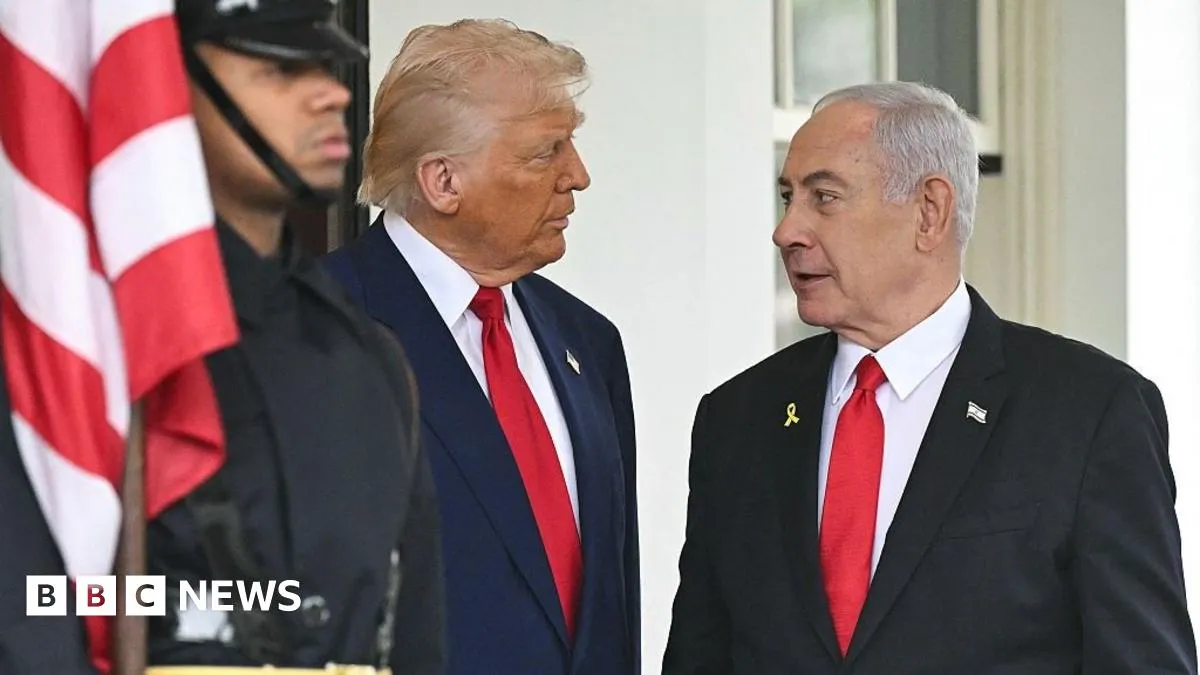
In a significant political event, Israeli Prime Minister Benjamin Netanyahu arrived at the White House for his second meeting with President Donald Trump since Trump resumed office in January. This meeting is particularly noteworthy as it comes just four days after Trump announced aggressive tariffs, including a steep 17% tariff on Israeli exports to the United States. The implications of these tariffs are profound, and Netanyahu's visit presents an opportunity to advocate for a reduction in these trade barriers.
During his visit, Netanyahu aims to make a compelling case against the newly imposed tariffs. Israel recently eliminated its own tariffs on American imports in an effort to foster better trade relations; however, the unexpected inclusion of Israeli goods in Trump's tariff policy has left many concerned about the potential economic impact. If Trump is receptive to Netanyahu's proposals, this meeting could serve as a pivotal moment in U.S.-Israel trade relations, potentially demonstrating how diplomatic negotiations can influence U.S. trade policies.
Despite the high stakes, expectations remain tempered. The White House has cancelled a formal press conference scheduled for later today, raising speculation about the nature of the discussions that will unfold. Instead, Netanyahu and Trump will engage with a smaller press pool during their sit-down in the Oval Office, a decision that hints at the sensitive nature of their discussions.
As the deadline for the new U.S. tariffs looms just two days away, over 50 world leaders have reportedly reached out to Trump, eager to negotiate and understand the ramifications of the U.S.-Israel talks. Countries around the globe are watching closely, hoping to glean insights that could inform their own economic strategies amidst rising trade tensions.
In a video message delivered from Budapest prior to his arrival in Washington, Netanyahu outlined key topics for discussion with Trump. He emphasized that the agenda would cover crucial issues such as hostages, military operations in Gaza, and the contentious tariffs. Netanyahu noted that he is the first foreign leader to visit Trump after the announcement of global tariffs, underscoring the unique relationship he shares with the U.S. president.
Amidst the political discussions, serious allegations of mistreatment and torture of Palestinian detainees in Israeli custody have surfaced. Reports from released detainees describe harrowing accounts of abuse, including chemical burns, electric shocks, and other forms of torture. The BBC has conducted interviews revealing that these detainees were held under Israel's Unlawful Combatants Law, which permits indefinite detention without charge for individuals deemed a security threat.
The Israeli Defense Forces (IDF) have responded to these allegations with a blanket denial, stating they reject claims of systematic abuse. However, the testimonies from detainees raise significant concerns about human rights practices within Israeli detention facilities.
The backdrop of Netanyahu’s visit is the ongoing conflict in Gaza, marked by the recent escalation of military action following the breakdown of a fragile ceasefire with Hamas. Since March, hostilities have resumed, with Hamas firing rockets into Israel, while Israel has maintained a blockade preventing essential aid from reaching Gaza. Netanyahu has indicated that military operations will intensify in response to Hamas's refusal to release Israeli hostages, which has drawn criticism from advocacy groups for perceived deception regarding the situation.
As Netanyahu prepares for his discussions with Trump, the stakes are high. This meeting marks an important moment for Israeli-U.S. relations, particularly as it coincides with pressing issues such as the return of Israeli hostages and the implications of U.S. trade policy. The outcomes of this meeting could have lasting effects on both nations, influencing not only their bilateral relations but also the broader geopolitical landscape.
Stay tuned for updates as our correspondent, Anthony Zurcher, reports live from the White House, bringing you the latest developments from this crucial meeting between two prominent leaders.